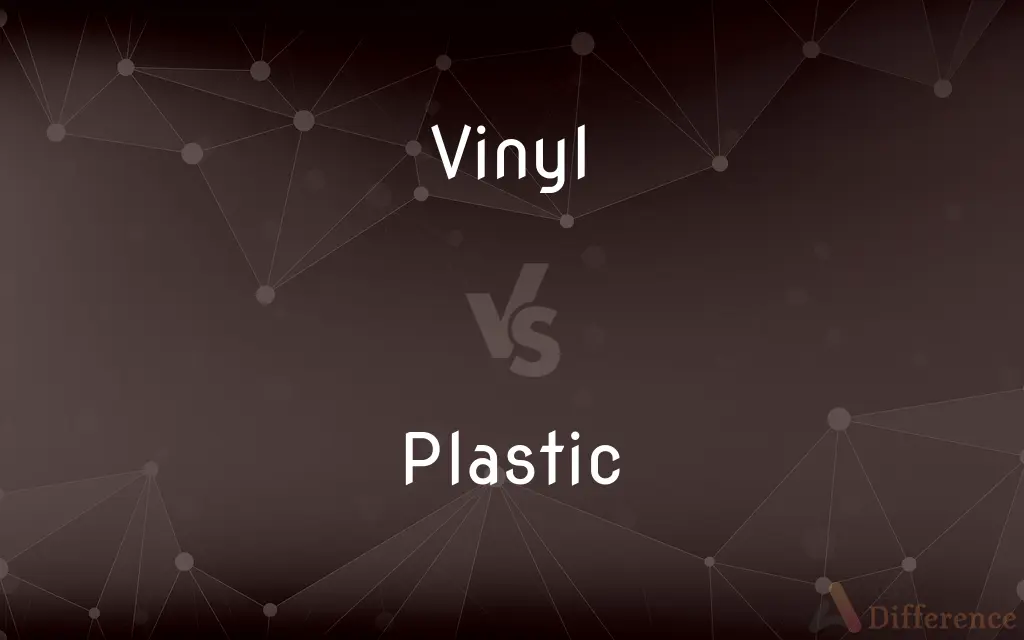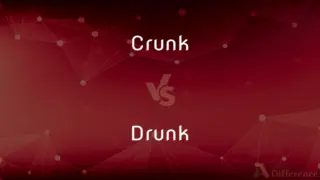Vinyl vs. Plastic — What's the Difference?
By Tayyaba Rehman — Updated on October 11, 2023
Vinyl is a specific type of plastic derived from ethylene and chlorine, known for its durability and flexibility. Plastic is a broad category of synthetic materials made from polymers, known for versatility and molding capabilities.

Difference Between Vinyl and Plastic
Table of Contents
ADVERTISEMENT
Key Differences
Vinyl is often associated with numerous commercial and residential products due to its notable durability. Plastic is a wide-ranging category of synthetic or semi-synthetic materials, encompassing numerous polymers, including vinyl.
Vinyl is admired for its resistance to moisture and non-conductive nature, making it apt for electrical applications. In contrast, plastic, in a general sense, may include various properties depending on the specific type being referred to.
Vinyl's application spans from records to flooring, known for its ability to replicate richer textures. Plastic, on the other hand, is utilized in a myriad of applications, from packaging to components in machinery due to its moldability.
Vinyl can be found extensively in home decoration, often utilized as a leather substitute due to its cost-effectiveness. Differently, plastic’s application in homewares is broad, seen in everything from containers to furniture construction.
Comparison Chart
Part of Speech
Noun
Noun
ADVERTISEMENT
Syllables
2 (Vi-nyl)
2 (Plas-tic)
Uses
Specific uses like records
Varied uses in numerous fields
Material Category
A type of plastic
General category of materials
Associated Items
Records, flooring, etc.
Bottles, bags, etc.
Compare with Definitions
Vinyl
Plastic in Surgery
She decided to undergo plastic surgery to alter her appearance.
Plastic
Plastic as Material
Plastic bottles are commonly used for beverage packaging.
Vinyl
Plastic as Material
Plastic bottles are commonly used for beverage packaging.
Plastic
Plastic as Payment
He paid for the meal using a plastic credit card.
Vinyl
Synthetic resin or plastic consisting of polyvinyl chloride or a related polymer, used for wallpapers and other covering materials and for gramophone records
The vinyl is cut to size with a craft knife
Vinyl floor tiles
Plastic
Plastic in Art
The artist molded plastic into beautiful sculptures.
Vinyl
Of or denoting the unsaturated hydrocarbon radical —CH=CH₂, derived from ethylene by removal of a hydrogen atom
A vinyl group
Plastic
Plastic as Adjective
The plastic deformation of the metal was studied under stress.
Vinyl
The univalent hydrocarbon group CH2=CH, derived from ethylene.
Plastic
Plastics are a wide range of synthetic or semi-synthetic materials that use polymers as a main ingredient. Their plasticity makes it possible for plastics to be moulded, extruded or pressed into solid objects of various shapes.
Vinyl
Any of various compounds containing the vinyl group, typically highly reactive, easily polymerized, and used as basic materials for plastics.
Plastic
A synthetic material made from a wide range of organic polymers such as polyethylene, PVC, nylon, etc., that can be moulded into shape while soft, and then set into a rigid or slightly elastic form
Mains pipes should be made of plastic or copper
Bottles can be made from a variety of plastics
Vinyl
Any of various typically tough, flexible, shiny plastics, often used for coverings and clothing.
Plastic
Made of plastic
Plastic bottles
Vinyl
Phonograph records considered as a group
A secondhand store that buys and sells vinyl.
Plastic
(of a substance or material) easily shaped or moulded
Rendering the material more plastic
Vinyl
The univalent radical CH2=CH−, derived from ethylene.
Plastic
Capable of being shaped or formed
Plastic material such as clay.
Vinyl
(countable) Any of various compounds and substances containing the vinyl radical, especially various tough, flexible, shiny plastics.
Plastic
Relating to or dealing with shaping or modeling
The plastic art of sculpture.
Vinyl
Phonograph records as a medium.
Many DJs prefer vinyl to CDs.
Plastic
Having the qualities of sculpture; well-formed
"the astonishing plastic beauty of the chorus girls" (Frank Harris).
Vinyl
A phonograph record.
Plastic
Giving form or shape to a substance
The plastic forces that create and wear down a mountain range.
Vinyl
(chemistry) Containing the vinyl radical.
Plastic
Easily influenced; impressionable
"The plastic mind of the bank clerk had been ... distorted by what he had read" (Rudyard Kipling).
Vinyl
Made of polyvinyl chloride.
Plastic
Made of a plastic or plastics
A plastic garden hose.
Vinyl
(music) Pertaining to a phonograph record.
Plastic
(Physics) Capable of undergoing continuous deformation without rupture or relaxation.
Vinyl
The hypothetical radical C2H3, regarded as the characteristic residue of ethylene and that related series of unsaturated hydrocarbons with which the allyl compounds are homologous.
Plastic
Capable of building tissue; formative.
Vinyl
A univalent chemical radical derived from ethylene
Plastic
Able to change and adapt, especially by acquiring alternative pathways for sensory perception or motor skills. Used of the central nervous system.
Vinyl
Shiny and tough and flexible plastic; used especially for floor coverings
Plastic
Marked by artificiality or superficiality
A plastic world of fad, hype, and sensation.
Vinyl
Plastic as Payment
He paid for the meal using a plastic credit card.
Plastic
(Informal) Of or obtained by means of credit cards
Plastic money.
Vinyl
Plastic in Art
The artist molded plastic into beautiful sculptures.
Plastic
Any of various organic compounds produced by polymerization, capable of being molded, extruded, cast into various shapes and films, or drawn into filaments used as textile fibers.
Vinyl
Plastic as Adjective
The plastic deformation of the metal was studied under stress.
Plastic
(Informal) A credit card or credit cards
Would accept cash or plastic in payment.
Plastic
A synthetic, solid, hydrocarbon-based polymer, whether thermoplastic or thermosetting.
Plastic
Credit or debit cards used in place of cash to buy goods and services.
Plastic
Insincerity; fakeness, or a person who is fake or arrogant, or believes that they are better than the rest of the population.
Plastic
An instance of plastic surgery.
Plastic
(obsolete) A sculptor, moulder.
Plastic
(archaic) Any solid but malleable substance.
Plastic
Capable of being moulded; malleable, flexible, pliant.
Plastic
Producing tissue.
Plastic
(dated) Creative, formative.
Plastic
(biology) Capable of adapting to varying conditions; characterized by environmental adaptability.
Plastic
Of or pertaining to the inelastic, non-brittle, deformation of a material.
Plastic
Made of plastic.
Plastic
Inferior or not the real thing.
Plastic
Fake; insincere.
Plastic
Having the power to give form or fashion to a mass of matter; as, the plastic hand of the Creator.
See plastic Nature working to his end.
Plastic
Capable of being molded, formed, or modeled, as clay or plaster; - used also figuratively; as, the plastic mind of a child.
Plastic
Pertaining or appropriate to, or characteristic of, molding or modeling; produced by, or appearing as if produced by, molding or modeling; - said of sculpture and the kindred arts, in distinction from painting and the graphic arts.
Medallions . . . fraught with the plastic beauty and grace of the palmy days of Italian art.
Plastic
A substance composed predominantly of a synthetic organic high polymer capable of being cast or molded; many varieties of plastic are used to produce articles of commerce (after 1900). [MW10 gives origin of word as 1905]
Plastic
Generic name for certain synthetic or semisynthetic materials that can be molded or extruded into objects or films or filaments or used for making e.g. coatings and adhesives
Plastic
Used of the imagination;
Material...transformed by the plastic power of the imagination
Plastic
Capable of being molded or modeled (especially of earth or clay or other soft material);
Plastic substances such as wax or clay
Plastic
Capable of being influenced or formed;
The plastic minds of children
A pliant nature
Plastic
Plastic in Surgery
She decided to undergo plastic surgery to alter her appearance.
Common Curiosities
What is vinyl?
Vinyl is a synthetic resin or plastic consisting of polyvinyl chloride.
What is plastic?
Plastic is a material consisting of various synthetic and semi-synthetic organic compounds that can be molded.
Is vinyl considered a type of plastic?
Yes, vinyl is a specific type of plastic, specifically polyvinyl chloride (PVC).
Why is plastic used in packaging?
Plastic is lightweight, durable, and can be molded into various shapes, making it versatile for packaging.
What are common uses of plastic?
Plastic is commonly used for packaging, building materials, toys, medical devices, and much more.
Is all vinyl waterproof?
Generally, vinyl is water-resistant but certain forms and products may not be fully waterproof.
Are there different types of vinyl?
Yes, vinyl can come in various forms, like rigid, flexible, and film, each suitable for different applications.
How is plastic made?
Plastic is typically made by polymerizing monomers, derived often from petroleum, into long-chain polymers.
Are vinyl records actually made of vinyl?
Yes, vinyl records are predominantly made from a particular type of plastic known as vinyl.
What are bioplastics?
Bioplastics are derived from biological substances rather than petroleum, used as an alternative to traditional plastics.
Can vinyl be recycled?
Yes, vinyl can be recycled, but its recyclability may depend on local facilities and the product type.
Why is plastic pollution a concern?
Plastic pollution is a concern due to its long degradation time and its impact on wildlife and ecosystems.
Can plastic be biodegradable?
Some plastics, known as biodegradable plastics, are designed to degrade within certain conditions and timescales.
What is a vinyl group in chemistry?
A vinyl group refers to ethenyl, with the formula CH2=CH-, and it is often found in organic compounds.
Can vinyl emulate other materials?
Yes, vinyl can be manufactured to mimic textures like leather, wood, and more.
Share Your Discovery

Previous Comparison
Crunk vs. Drunk
Next Comparison
Extortion vs. RacketeerAuthor Spotlight
Written by
Tayyaba RehmanTayyaba Rehman is a distinguished writer, currently serving as a primary contributor to askdifference.com. As a researcher in semantics and etymology, Tayyaba's passion for the complexity of languages and their distinctions has found a perfect home on the platform. Tayyaba delves into the intricacies of language, distinguishing between commonly confused words and phrases, thereby providing clarity for readers worldwide.















































